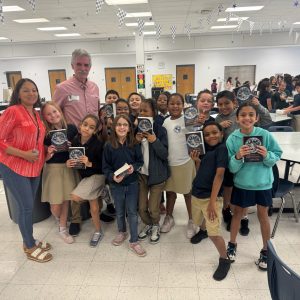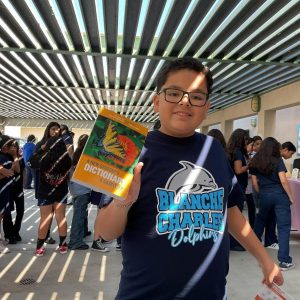Rotarian is walking 1,000 miles to buy dictionaries for kids
By Tracey Coveart/The Scugog Standard
Literacy is a critical skill linked to economic and social development, yet almost 50 per cent of Canadians struggle with words and numbers. And with more than 10 million people in this country working at marginal or modest levels of literacy, it is a growing concern. Fortunately, here in Scugog, reading and writing have a new champion: Dennis Bayley and the Rotary Club of Port Perry’s Literacy Committee.
When Dennis became chair of the committee last year, he set his sights high: on a Rotary Club District Award. Literacy work was already underway but much more needed to be done to win the coveted award. The club had to be actively engaged in five or six literacy related projects just to be considered.
“We won a District Literacy Award for Division 7070,” said Dennis proudly. “There were just seven of 51 clubs from Trenton to Toronto to earn the distinction, and little old Port Perry was one of them.”
With that win under their belt, the committee decided to push on to the zone level.
“It’s a big zone,” said Dennis. “Zone 32, includes all of Canada, Alaska, Russia and the French islands of St. Pierre and Miquelon.”
And it involved an even bigger commitment to literacy. “We had to be involved in 13 or 14 projects to be considered,” Dennis explained.
Amazingly, the club won a zonal award as well – and received a letter of congratulations from MP Bev Oda. “We’re very proud of that,” said Dennis.
And while it’s a tremendous honour and an acknowledgement of the club’s hard work and dedication, the win didn’t come as a complete surprise to the Port Perry Rotary Club’s Literacy Committee. They are a very dedicated bunch.
“We bring literacy related speakers to talk to members of the Rotary Club to keep them interested in the subject,” said Dennis, and to sustain support for all the projects the committee has on the go.
These include a $100,000 donation to the Scugog Memorial Public Library expansion fund and financing transportation for an inter-generational literacy program that brings students from Prince Albert Public School to the Port Perry Villa to interact one on one with seniors. “They talk to the residents and read to them,” said Dennis, “which increases their vocabulary and their reading skills.”
The club is also involved with school boards, police services and the Baagwating Community Association in a First Nations literacy project with five schools in the Durham District School Board. The students (none of them in Port Perry schools) read books written by First Nations authors.
“A parallel project which is expanding this year to involve the northern First Nations community is doing exactly the opposite,” said Dennis, with First Nations students reading books about other cultures. “We’re going to bring all of the students involved in both halves of the project together twice a year at the Mississaugas of Scugog Island Health and Resource Centre.”
And to bolster their bid for back-to-back zonal awards, the club has contacted the Durham Regional Literacy Council to improve the reading and writing skills of less literate people over the age of 16. “We’re going to see if our programs can mesh to do something for functionally challenged adults in the Durham Region,” said Dennis.
The Literacy Club’s main objective, said the chair, “is to identify areas where we can make a difference.”
One of those areas is making ‘words’ more accessible to school children. And to do that, the literacy committee has joined The Dictionary Project, which began in 1992 when a woman in Savannah, Georgia, gave dictionaries to 50 local students.
In her lifetime, Annie Plummer raised enough money to provide 17,000 dictionaries to children in Savannah. In 1995, The Dictionary Project was established as a non-profit association, with the goal of ‘assisting all students in completing the school year as good writers, active readers and creative thinkers by providing them with their own personal dictionary.’
The association uses charitable donations to make dictionaries available to service clubs (mainly the Rotary Club in Canada) for $2 a copy. Since 1995, 14,444,648 dictionaries have been distributed across North America – 2,488,454 in 2009 alone. And this year, 260 Grade 4 students in Port Perry’s public and Catholic schools will get a dictionary courtesy of The Dictionary Project and the Port Perry Rotary Club.
“Thirty to 40 per cent of Canadians can’t afford a computer,” said Dennis, “and even if they can, a computer is no good if you can’t read. Kids are going through the system without acquiring basic literacy skills and putting a dictionary in their hands will help.”
Several recent studies at the University of Leicester in the UK regarding the influence of dictionary use on children’s reading, spelling and phonology found that ‘persuading young children to use a dictionary more often could develop their spelling skills, possibly by encouraging them to be more proactive.’
And when children have a dictionary at hand, they are more likely to use it. “Studies show that kids are not likely to get up from their computers to go and get a dictionary when they run into trouble,” said Dennis. “But if there is a dictionary right there beside them, they are inclined to use it.”
Dennis is going to put his money (or yours, really) where his mouth is to further the cause with his ‘1,000 Mile Walk for Literacy.’
On July 6, 2009, Dennis had a heart attack. Since then he has walked 1,000 miles on a treadmill and his heart health has improved dramatically.
“The results from my latest stress test are fantastic,” said Dennis, who walks 4.25 miles in 58 minutes five days a week at a 10 per cent incline. “I’m keeping pace with that no problem.”
To make a personal commitment to literacy, Dennis is collecting pledges for his next 1,000 miles.
“For every two dollars I raise,” said Dennis, “the Rotary Club of Port Perry will provide a Grade 4 pupil in Scugog Township with a dictionary. Any excess funds I collect will go to other literacy related projects funded by the Rotary Club.”
No child will go without, of course, as the Rotary Club has already advanced the money, “but if I can collect $300 or $500 that’s three hundred or five hundred dollars that can be spent on something else. Every little bit helps.”
So far, said Dennis, who has already logged about 350 miles in the current Rotary year which started in July, “the response has been good. The first person I approached gave me $20!” (Tax receipts will be issued for donations of $20 or more.)
Dennis is hoping his story and the literacy work of the Port Perry Rotary Club will get other Rotary Clubs involved in The Dictionary Project (www.dictionaryproject.com). I’m already speaking to other clubs,” he said. “Once we start, I’m hopeful others will take up the challenge.”
To help Dennis help the Rotary Club help kids, drop in to The Scugog Standard offices at 94A Water St. in Port Perry and drop off your pledge or contact Dennis at dennis.bayley@sympatico.ca. You can also call him at 905-985-1342 to arrange your donation. If he doesn’t pick up the phone, leave a message. He’ll call you back as soon as he’s off the treadmill!





